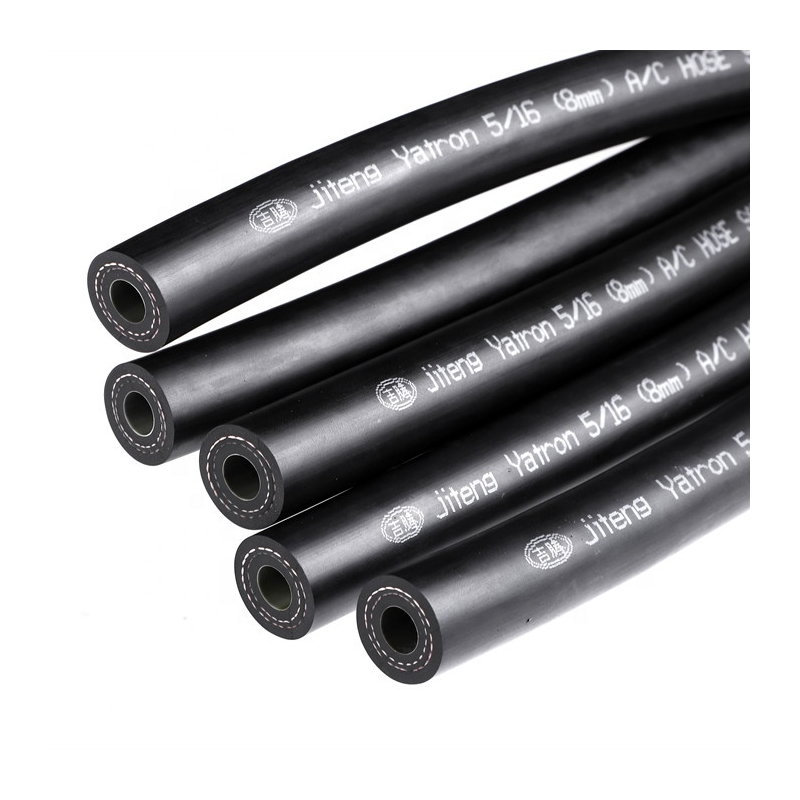Hydraulic Hose Solutions for Efficient Fuel Line Applications and Performance
Dec . 14, 2024 13:19 Back to list
Hydraulic Hose Solutions for Efficient Fuel Line Applications and Performance
Hydraulic Hose for Fuel Line Essential Components for Efficient Functionality
Hydraulic hoses are critical components within many mechanical systems, facilitating the transmission of fluids under pressure. Among the various applications of hydraulic hoses, one of the most vital is in fueling systems, particularly in vehicles and heavy machinery. Understanding the role, construction, and selection of hydraulic hoses designed specifically for fuel lines is crucial for anyone involved in automotive engineering, maintenance, or operations.
Understanding Hydraulic Hoses
Hydraulic hoses are specially designed tubes that carry pressurized fluids to various parts of a machine or vehicle. They consist of three primary components the inner tube, the reinforcement layer, and the outer cover. The inner tube is typically made from synthetic rubber or thermoplastic to prevent fuel permeation, ensuring that the hose remains durable and leak-proof. The reinforcement layer, often made of braided steel, provides the hose with the strength needed to withstand high pressures. Lastly, the outer cover protects the hose from environmental factors such as abrasions, chemicals, and extreme temperatures.
Why Fuel Lines Require Hydraulic Hoses
Fuel systems operate under varying pressure levels and temperatures, necessitating robust and reliable components. Hydraulic hoses designed for fuel lines must be resistant to fuel's corrosive nature, capable of withstanding fluctuations in pressure without compromising safety, and flexible enough to accommodate vibration and movement during operation.
Using the appropriate hydraulic hose for fuel lines helps to prevent potential failures, such as leaks that can lead to catastrophic accidents, loss of fuel, and environmental hazards. As a result, stringent standards and guidelines are in place to ensure that hoses meet the necessary specifications for fuel handling, including compliance with organizations like SAE (Society of Automotive Engineers) and ISO (International Organization for Standardization).
Selecting the Right Hydraulic Hose for Fuel Lines
When selecting a hydraulic hose for fuel lines, several factors need to be considered to ensure optimal performance
hydraulic hose for fuel line

1. Material Compatibility The hose must be compatible with the specific type of fuel it will be carrying, whether gasoline, diesel, or a biofuel blend. Incorrect material selection can lead to degradation and eventual hose failure.
2. Pressure Rating Each hydraulic hose has a maximum pressure rating, which indicates the highest level of pressure it can withstand safely. It is critical to choose a hose that can handle the demands of the fuel system without bursting or leaking.
3. Temperature Range Fuel lines can experience varying temperatures, from ambient conditions to extreme heat generated during engine operation. The chosen hose must be able to handle the temperature extremes without compromising its integrity.
4. Flexibility and Bend Radius Hydraulic hoses need to be flexible enough to fit into confined spaces and accommodate movement. However, excessive bending can negatively affect performance, so a proper bend radius must be observed.
5. Length and Fitting Compatibility The length of the hose is also a crucial factor. It should be long enough to connect the required components without being excessively taut. Additionally, the fittings must match the connection points to ensure a secure fit that prevents leaks.
Maintenance and Inspection
Regular maintenance and inspection of hydraulic hoses are essential to prolong their lifespan and maintain safety. It is important to visually inspect hoses for signs of wear, such as cracks, abrasions, or bulges. Additionally, periodic pressure testing can help identify any weaknesses. At the first sign of damage, hoses should be replaced to ensure the continued safe operation of the fuel system.
Conclusion
In the realm of mechanical engineering, hydraulic hoses play an indispensable role in fuel line applications, ensuring efficient fuel delivery and system integrity. Choosing the right hose, coupled with regular maintenance, is fundamental to preventing failures and ensuring safety. By prioritizing the correct selection and upkeep of hydraulic hoses, operators can enhance the reliability and performance of their machinery, ultimately contributing to a safer and more efficient working environment.
